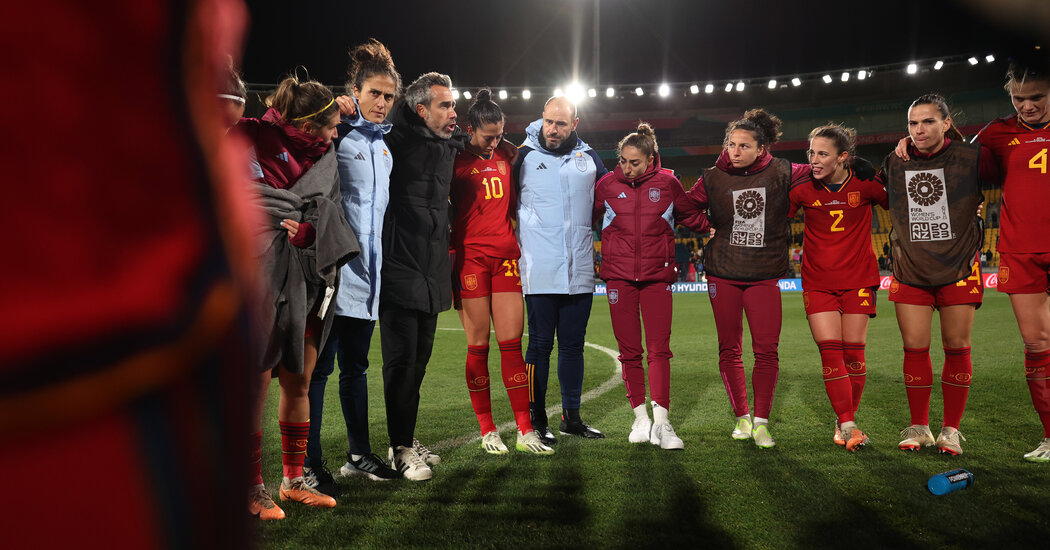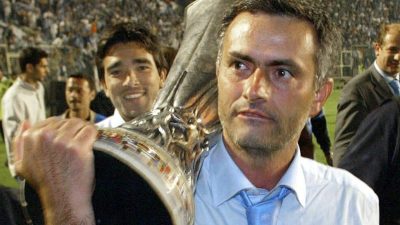A couple of days before Spain’s first genuine test of this World Cup — an encounter with Japan in Wellington, New Zealand — team officials became aware of an issue. The players, it turned out, were bored. Their families and friends, who had traveled halfway around the globe to watch their games, were bored. Some of the squad had young children in tow. They were bored, too.
Spain had chosen the town of Palmerston North as its base for the tournament. It made perfect sense. The team was guaranteed to play all of its games until the semifinal on New Zealand’s North Island. Palmerston, a university town a couple of hours north of Wellington, and a short flight from Auckland, fit the bill.
But three weeks into their stay — Spain arrived in New Zealand well in advance of its first game, hoping to draw the sting from the jet lag — the place had started to pall. New Zealand’s second-largest noncoastal city boasted precious little to do, particularly in the evenings. The players, and their families, wanted to move.
Even with the game with Japan looming, the Spanish federation acceded to the players’ request. Officials began the laborious task of moving an entire elite sports team — 23 players, 31 coaches and support staff, piles of equipment and mounds of accouterments — to the James Cook Hotel in Wellington in the middle of a tournament.
And as if that was not enough, the federation did what it could to help the dozens of family members who formed the team’s traveling caravan with their arrangements, too. Logistically, it was a considerable heave. The kind that is hardly ideal from a sporting perspective. In Spain’s case, though, it was worth it, just to keep the peace.
Few teams arrived in Australia and New Zealand with more pedigree than Spain. Jorge Vilda’s team, after all, boasts not only Alexia Putellas, the two-time Ballon d’Or winner, but also Aitana Bonmati, the midfielder regarded as her heir apparent. They are two of nine members of the squad drawn from Barcelona, European club soccer’s unquestioned powerhouse.
No team, though, landed in quite such a fragile state. Last September, in the aftermath of Spain’s elimination from the European Championship a month or so earlier, 15 players sent the country’s federation a boilerplate email withdrawing themselves from consideration for the national team.
The signatories included not just Bonmati, but Patri Guijarro, Mariona Caldentey and Mapi León, central figures in the great Barcelona side, as well as Ona Batlle, Laia Aleixandri and Leila Ouahabi, some of the country’s most high-profile exports. Three players — Putellas, the forward Jenni Hermoso and Irene Paredes, then the national team’s captain — did not send the email but were seen as giving it their tacit support.
Spain had, in an instant, lost the core of its golden generation.
The precise nature of the grievances that had forced the players’ hand remained oblique in public — the email referred only to “the latest events that have occurred in the national team, and the situation they have created” — but, privately, the list of complaints was both long and, in the context of women’s soccer, distinctly familiar.
The players, now ensconced in professional environments at their clubs, felt the national team program was outmoded, not up to the standard they had come to expect. The facilities the federation provided for them were subpar, the players believed. They traveled to some games by bus, rather than plane, as many of their rivals did, or as they would at club level.
Vilda, the coach, was said to have fostered an oppressive workplace environment, one in which the players’ every move was monitored by his staff. Nobody ever confirmed as much, but it was widely assumed that his removal would be required if the players were to contemplate returning.
The federation, though, decided on a less conciliatory approach. Vilda was, in the words of Luis Rubiales, the federation president, “untouchable.” If the group of “15 plus three,” as it had come to be seen, did not want to play for Spain, that was fine: Spain would go and find some people who did. Vilda called up a scratch squad, and immediately embarked on a run of 16 games in which his team drew once, lost once, and won the rest. Among the teams it defeated was the mighty United States, but also Japan, Jamaica and Norway.
As the World Cup drew closer, though, the hard-line stance started to soften. Hermoso and Paredes, only informally associated with the strike, were called back into the team, forging a path for the others. The Spanish players’ union volunteered to mediate a meeting between the holdouts and Ana Álvarez, the federation’s director of women’s soccer.
The federation refused, but made an alternative suggestion: Álvarez would meet with every player individually, giving them an opportunity to lodge their complaints. Through May and June, she held more than a dozen meetings with the disaffected players, inviting some to Madrid and traveling to Barcelona to see others.
Each meeting lasted two or three hours, according to people in soccer with direct knowledge of the talks who spoke on condition of anonymity to discuss the private, and personal, discussions. Álvarez sought to understand the roots of their discontent, to gather feedback, to ask how each player would like things to change in the future. Most of the meetings were cordial, and constructive.
At the end, though, there was an awkward coda. The players had removed themselves from international contention by email. They had to make themselves available again in the same way. The federation would not risk calling up anyone who might reject the olive branch.
Conscious of not only their own professional ambitions but various commercial agreements, the majority of the players acquiesced. Guijarro and León were among the handful who refused. “Some things have to change, and if they don’t, then it won’t go away,” León told the Spanish newspaper Mundo Deportivo earlier this year. “Missing the World Cup will bother me a lot, but I have values and beliefs.” Her Barcelona teammate, Guijarro, cited “consistency” as her explanation.
When Vilda named his World Cup squad, though, only three of the players to have signed the original email — Bonmati, Batlle and Caldentey — were included. The others had all been omitted. The coach had decided, instead, to prioritize those players who had helped Spain prepare for the tournament.
Still, the situation was febrile. The 23 players under Vilda’s aegis might all have “wanted to be here,” as Paredes put it, but that unity of purpose veiled deep schisms. His squad now contained both mutineers and their replacements.
He had done what he could to ease the tensions, not only visiting a Barcelona training session in the spring but, according to those players who had remained in the national team squad throughout, relaxing his approach. “It has been a tough, special season,” Vilda said on the eve of the World Cup. “But it has given us chance to learn. The federation has always been open to dialogue, and to solve things.”
The decision to listen to the players’ requests to move their base midway through the tournament, then, is perhaps the most dramatic illustration of that détente, but it is not the only one. Spain now boasts a vastly expanded coaching staff, including for the first time both a nutritionist and a podiatrist in the traveling party. The standard of accommodation and transport has improved, too.
The players were encouraged to expand that further, too, by inviting family and friends along at the federation’s expense: Each member of the World Cup squad was granted an allowance of $16,000 to pay for the travel and lodging.
The newspaper El País has reported that dozens of parents, siblings and children are in New Zealand, sitting behind the dugouts at Spain’s games, arranging their activities on a WhatsApp group titled “Free Tours.”
The players have been allowed to spend considerable amounts of down time with them. Even after the game with Japan ended in a deflating 4-0 loss, they were given a morning off to see their loved ones. The atmosphere, according to those on the squad, is much more relaxed and “flexible” than it has been at previous tournaments.
There has been a concerted attempt among the players, too, to defuse any lingering tensions. They have veered toward the traditional: long sessions playing two card games, Virus and Brandy, and a renewed focus on forfeits — singing or dancing in front of their peers — for those players who lose games in training.
“Things are not forgotten,” Paredes said in an interview with El País. “But we must put them aside knowing that we have a common goal and that we are going for it.”
The sense of purpose is such that Bonmati, one of the signatories of the original email, even cast the defeat to Japan as a bonding experience. “This is going to unite us more than ever,” she said.
Whether that is how it plays out, of course, remains to be seen. Should Spain lose to Switzerland on Saturday in round of 16, it is not difficult to imagine the uneasy truce breaking.
Spain’s preparation for this World Cup, one it genuinely believed it could win, has been fraught and tense and, at times, toxic. It has had enough drama.
What it needs, from this point on, is for everything to be as boring as possible.
Sumber: www.nytimes.com








